SPFBO 7 – The Sixth Eliminations
Welcome to our Sixth Eliminations post for SPFBO 7.
This week, we have grouped our five brave entrants together into a “Different” batch. You can find out more about this week’s posts in our Meet the Batch post. Read on to find out which three of them fell in our sixth batch of eliminations, listed in alphabetical order.
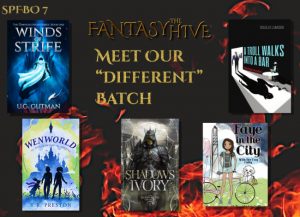
Faye in the City
by K.E.Willis
Theo:
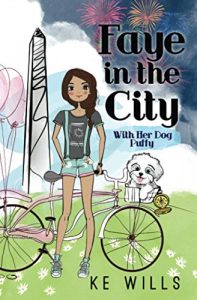 The fantasy element is quite light – in the first 20% we get to see that the main protagonist Faye has some kind of skill of precognition, influence and awareness of moods/emotions – which could be quite cool. The main thrust of the story though is young woman making friends in a very recognisable contemporary city. The opening suffers for me from a lack of compelling conflict, which is not to say that every story has to have imminent death or world shattering disorder confronting its protagonists. However, even at the small personal level, conflict has to seem important rather than trivial. There are a few typos/word choices (“relished in” rather than “revelled in” or just “relished”) which suggest an additional layer of editing might have helped. But overall the book seems to aspire to be a light fluffy story which is hard to sell in this kind of competition.
The fantasy element is quite light – in the first 20% we get to see that the main protagonist Faye has some kind of skill of precognition, influence and awareness of moods/emotions – which could be quite cool. The main thrust of the story though is young woman making friends in a very recognisable contemporary city. The opening suffers for me from a lack of compelling conflict, which is not to say that every story has to have imminent death or world shattering disorder confronting its protagonists. However, even at the small personal level, conflict has to seem important rather than trivial. There are a few typos/word choices (“relished in” rather than “revelled in” or just “relished”) which suggest an additional layer of editing might have helped. But overall the book seems to aspire to be a light fluffy story which is hard to sell in this kind of competition.
Belle:
This was a story I struggled to focus on. I had trouble seeing where the plot was heading, as there didn’t seem to be much in the way of stakes, and what little conflict there was seemed to be a bit too contrived. Beyond the vague hints of a potential psychic ability, I didn’t see anything that I would consider fantasy – it definitely reads more like a contemporary novel. I think it would be a light and easy read, but there wasn’t enough of a hook to keep me reading any further.
Peter:
The fantasy in this book is quite light – the MC Faye has some interesting skills of a psychic nature, and her dog helps bring the reader into an interesting setting. I struggled to find any depth to this story, there are hints of conflicts and a situation but nothing really happens, while this may suit some readers it was not something that particularly hit home with me. Sadly this was another book in our batch that was not for me.
Scarlett:
This novel feels very contemporary and light, aimed perhaps at a young adult audience. The main character and her dog sort of invite the reader to a warm-hearted romance in a US metropolitan city and everything about it feels too cute. As much as that can be a good thing, it was difficult for me to find depth and traction in the story. It has been mentioned that there isn’t a conflict or tension to grip on, which left me just going through the motions without an inevitable investment into the characters or the plot. If there would have been a hook somewhere close to the start, it would have made a difference I think. The fantastical elements in this novel are also on the very light side of things, but again, will appeal to a certain audience in my opinion. Unfortunately, it wasn’t for me.
Calvin:
I didn’t know quite what to expect when I picked up this book. After reading the first 20%, I’m still not quite sure how to describe the story. There isn’t much fantasy in the first portion of the story, to the extent that if I didn’t know it was supposed to be fantasy, I don’t know that I would have labelled it as such. It feels like a bit of a slice of life tale, but even as a slice of life story there isn’t much tension or conflict. Unfortunately, I also didn’t find Faye, the main character, particularly interesting or compelling, and so I never really felt hooked into reading more. It’s certainly possible that things pick up after 20%, but for the purposes of SPFBO, this one didn’t do it for me.
A Troll Walks into a Bar
by Douglas Lumsden
Theo:
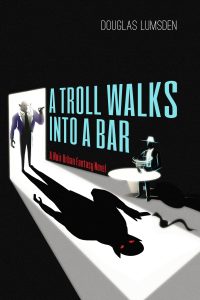 This is a greeny/orange for me. The formatting seems off with page numbers dotted about the text, the male gaze-ishness of the protagonist and the casual misogyny of his troll nemesis are off putting, and sometimes the prose wears its homage to Chandler a little too heavily. However, it does rattle along at a reasonable pace, I got to 22% because I was caught up in a battle scene where a promising female character makes an appearance which may yet balance out some of the earlier irritations over the descriptions and representations of female characters. It had a few lines I liked
This is a greeny/orange for me. The formatting seems off with page numbers dotted about the text, the male gaze-ishness of the protagonist and the casual misogyny of his troll nemesis are off putting, and sometimes the prose wears its homage to Chandler a little too heavily. However, it does rattle along at a reasonable pace, I got to 22% because I was caught up in a battle scene where a promising female character makes an appearance which may yet balance out some of the earlier irritations over the descriptions and representations of female characters. It had a few lines I liked
“My wallet was as empty as a pawnbroker’s heart”
and the world building augments traditional (and rather stereotypical) trolls, elves, gnomes and dwarves with an interesting addition of sea nymphs.
Belle:
I don’t read a lot of noir-types, so I was pretty keen to read this one. Unfortunately, I couldn’t get past the misogyny and that really dampened my enjoyment of what could have been a really fun detective story. I did like the writing style and worldbuilding, but ultimately it was very much not for me.
Peter:
When I picked this one up it had an interesting noir setting. I enjoyed the idea of a detective story, it has a nice sleuth detective style. While I was able to read through some of the issues with the male character and the misogyny of his Troll companion, the story does flow at a reasonable pace but weighed down by an info dump and some well used fantasy tropes. The book reads well, it didn’t really hit all the right notes for me but it was entertaining and, as Theo notes, the introduction of Sea Nymphs was interesting.
Scarlett:
So this story is quite different from the other ones entered in our batch of contestants. It’s the only one that sort of has a noir, sleuth detective vibe, taking place in back alleys and dingy back rooms in an urban metropolis. With a healthy smattering of dirty politics and dry humour, it has many elemental fantasy components such as gnomes, dwarfs and dragon lords we enjoy in the genre. To me it felt like, if you combined the detective writings of Sue Grafton with Jim Butcher, you would have a product somewhat close to this novel. I thought it was highly readable, but it didn’t hit all the notes for me. This might be because I don’t read much noir, and that combo as it is coupled with fantasy, wasn’t all the way to my taste. Someone with an appreciation for witty dialogue and straight faced one liners, will enjoy this quite a bit though, I think. It just didn’t work as well for me.
Calvin:
The biggest disappointment to me with this one was the male gaze and the rather blatant misogyny of some of the characters. Having said that, I did find the character voice to be very well done. This reads like a detective story, and I definitely enjoyed that aspect. The story also moves along at a good pace; I was hooked earlier and didn’t have any trouble at all reading to 20%. However, there were moments when the narrative felt a little bit info-dumpy. There are also plenty of fantasy races and tropes used, so for readers irritated by those fantasy tropes, this is one to steer clear of.
Wenworld
by T.R.Peston
Theo:
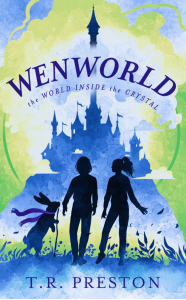 This is a strange kind of world, as far as I can gather some kind of flat earth kind of set up with a combined moon/sun fixed in its sky that flips (morphs) to turn night into day for everyone. Some people possess magic energy (kanah), whose nature differs depending on whether they were born under the moon(side) or the sun(side). Magic enables them to wield spells (curses) and children can be trained in how to use their magic by master/wizards (oracles). The first 20% of the story introduces us to Ika and Channdi, two teenagers who are on a revenge quest/training journey in pursuit of a master oracle who committed a murder in the prologue. There are some odd creations that sort of worked or didn’t. Ika and Channdi are being trained by a magic rabbit (Cinnamon) who lives in a kind of hollow rock backpack (Gritka) that Ika lugs around. Cinnamon feels a bit like a cross between Yoda, Splinter (who trained the Teenage Mutant Hero Turtles), and the lethal rabbit from Monty Python and The Holy Grail. The Gritka feels like a combined genie’s magic lamp and Tardis. As I read this it felt like the author’s focus had been on leaps of world building and the intricacies of a magic system, which meant that the bread and butter stuff of compelling characterisation and smooth prose had lost out. When we met the forest of talking dancing trees in party pink, I did feel that the story was losing its way. While no book is immune from typos, there were enough points of misused words, or inappropriate words to make me think the book needed a good edit. eg conceited used where conceded would have made sense, emerged misspelled as immerged. Yet in other places I found myself sent scurrying to a dictionary to find meanings of words like flocculent and copasetic, which – although correct in the context they were used – did feel a bit extravagant to the point of purpling the prose. There are interesting world concepts, but the jarring bits of prose and focus on magic systems over character meant the story did not fire me sufficiently to want to read on.
This is a strange kind of world, as far as I can gather some kind of flat earth kind of set up with a combined moon/sun fixed in its sky that flips (morphs) to turn night into day for everyone. Some people possess magic energy (kanah), whose nature differs depending on whether they were born under the moon(side) or the sun(side). Magic enables them to wield spells (curses) and children can be trained in how to use their magic by master/wizards (oracles). The first 20% of the story introduces us to Ika and Channdi, two teenagers who are on a revenge quest/training journey in pursuit of a master oracle who committed a murder in the prologue. There are some odd creations that sort of worked or didn’t. Ika and Channdi are being trained by a magic rabbit (Cinnamon) who lives in a kind of hollow rock backpack (Gritka) that Ika lugs around. Cinnamon feels a bit like a cross between Yoda, Splinter (who trained the Teenage Mutant Hero Turtles), and the lethal rabbit from Monty Python and The Holy Grail. The Gritka feels like a combined genie’s magic lamp and Tardis. As I read this it felt like the author’s focus had been on leaps of world building and the intricacies of a magic system, which meant that the bread and butter stuff of compelling characterisation and smooth prose had lost out. When we met the forest of talking dancing trees in party pink, I did feel that the story was losing its way. While no book is immune from typos, there were enough points of misused words, or inappropriate words to make me think the book needed a good edit. eg conceited used where conceded would have made sense, emerged misspelled as immerged. Yet in other places I found myself sent scurrying to a dictionary to find meanings of words like flocculent and copasetic, which – although correct in the context they were used – did feel a bit extravagant to the point of purpling the prose. There are interesting world concepts, but the jarring bits of prose and focus on magic systems over character meant the story did not fire me sufficiently to want to read on.
Belle:
Wenworld was another book that I struggled with. The worldbuilding and magic system were interesting and different, but the way we learned about them was so dense, and the magic system so complex, that it took me right out of the story each time a new explanation came up. I found the character’s motivations to be inconsistent, especially with the vast difference between how Ika treats the Oracle and how the worldbuilding sets them up as something to be revered. I also struggled with the word choices, from misused words to unnecessary ones, and this did dampen my enjoyment a bit. The author has created a really different world but it is not one for me.
Peter:
This was an interesting book, it had some echoes of Discworld and that is not a bad thing. The flat Earth idea, flipping between stages of light and dark and providing characters with their magic system. It was interesting but info dumpy, I enjoy a hard magic system but only when I learn about it over the course of a book and it was complex, I found myself back between stages to check something out and I love it when a book flows and sadly this didn’t. It also had rather interesting choices of vocabulary, which was great to see but blimey why was it done? I tried to like it, but it was another one that wasn’t for me.
Scarlett:
I don’t think I could have described this book any better than Theo, to be honest. I found this to be a very quirky, abstract read and it was not for me. Somewhat reminiscent of Discworld, which I also found to be strangely unrelatable to, I could not warm up to the characters or the animals presented in this tale. This is a YA novel, I believe, and the cover is fantastic. I wanted to enjoy this book so much more than I did. If I could describe it a bit better in any way I would, but Alice in Wonderland or Coraline vibes come to mind…just that kind of atmosphere I don’t enjoy. I had taken notes that there were many injections of information and strange vocabulary along the way and it made for a bumpy read that kept jolting me from the main plot. Unfortunately, this novel didn’t work for me.
Calvin:
This is another one where I just don’t know what to say. There is an interesting magic system in this one. I really enjoyed reading and learning about it. Having said that, the explanations of the magic system can become more than a little info-dumpy and, frankly, complex. Even with my love of complex magic systems, I found myself scratching my head at moments trying to wrap my mind around the magic. The world itself is also pretty complex and the author often tries to explain that world to us, rather than showing it or allowing things to be revealed over time. As a result, there is a lot to take in with this story, from the very opening pages, and it can feel more than a little overwhelming. In addition to this, the prose is not particularly smooth. Sentence structure and dialog can seem stilted at times. On the other hand, the author also makes use–from time to time–of some truly obscure vocabulary. I enjoy learning new words, but in this case it only served to make the narrative more jarring alongside numerous typos. There is definitely some wonderful world building and a complex magic system in this one, but it doesn’t come together as smoothly as it needs to.
And so our quarter-finalists are
Shadows of Ivory by T.L.Greylock/Bryce O’Connor and Winds of Strife by U.G.Gutman
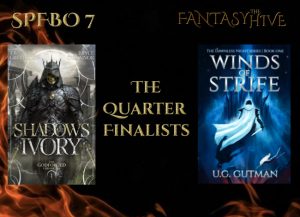
Links:
Week 1 ‘Our World’: Meet the Batch | Eliminations | Quarter-finals
Week 2 ‘Epic’: Meet the Batch | Eliminations | Quarter-finals
Week 3 ‘Leaving Home’: Meet the Batch | Eliminations | Quarter-finals
Week 4 ‘Kick Ass’: Meet the Batch | Eliminations | Quarter-finals
Week 5 ‘Starting Anew’: Meet the Batch | Eliminations | Quarter-finals
